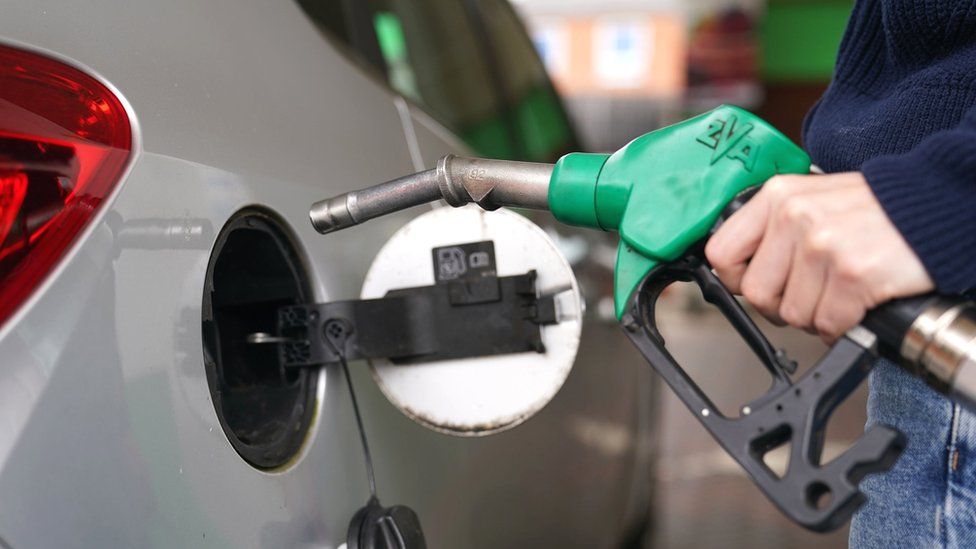
Oil prices rose on Thursday amid confusion over whether major producers would help to plug a gap in supplies from Russia.
The United Arab Emirates had appeared to push members of the Opec producer group to raise output, only for the UAE's energy minister to quash hopes.
The oil price rose more than 5%, after a 17% fall on Wednesday.
"To suggest the oil market is confused would be an understatement," said analyst Stephen Innes.
US President Joe Biden and other leaders have pledged to try to ease the price pressures for households. Officials from the US have been in talks with oil producers aimed at boosting supply.
"We favour production increases and will be encouraging Opec to consider higher production levels," Ambassador Yousuf Al Otaiba said in a statement tweeted by the UAE Embassy in Washington.
But the energy minister Minister Suhail al-Mazrouei said later that the Gulf state remained committed to the existing Opec monthly output agreement, which fixes how much crude is produced by member countries.
Oil prices have jumped more than 30% since 24 February, touching $139 (£105) a barrel at one point this week. The oil price had fallen back to about $106 a barrel at one point on Wednesday, but by Thursday morning it was trading at around $116.
On Tuesday, German Economy Minister Robert Habeck issued an "urgent appeal" to Opec oil producers to increase output "to create relief on the market".
Saudi Arabia-led Opec and an extended group of oil producers called Opec+ - which includes Russia - have agreed to avoid a price war and keep control over the market.
Mr Innes, managing partner of SPI Asset Management, said: "To suggest the oil market is confused would be an understatement as we are in an unprecedented situation."
Commonwealth Bank commodities analyst Vivek Dhar said: "We think it will be challenging for Opec+ to boost production in this environment."
Worries about oil and gas supplies have led to soaring domestic heating bills and fuel prices at the pump. Both petrol and diesel prices hit new records in the UK on Wednesday, according to the RAC motoring group.
Unleaded petrol was 159.57p a litre on average, while diesel was 167.37p.

Analysis:
By Sameer Hashmi, Middle East business correspondent
Despite the mixed messages coming out from the UAE, there is a broad consensus within Opec+ that there is no immediate need to boost oil production faster. So, even if the UAE tries to convince other members to increase production during the next meeting, it will be difficult to find many backers.
While Abu Dhabi is a prominent member of Opec+, Riyadh and Moscow are the leaders of the pack and they are the ones who call the shots. Any decision to increase supplies will essentially boil down to Saudi Arabia.
While the UAE is keen to increase production, it is very unlikely that it will break ranks and pump more oil unilaterally. Both the Saudis and the Emiratis have maintained a neutral stance during the course of this war, and the former would be unwilling to take any decision related to Opec+ that the Russians would oppose.
Opec+ has attributed the recent rise in prices to market volatility caused by geopolitical tensions and maintained that there is no shortage of supplies in the market.


RAC fuel spokesman Simon Williams said: "A tank of petrol is now almost £88 while diesel has now gone over £92. Diesel unfortunately appears to be on a clear path to £1.70 a litre.
"As this is an average price, drivers will be seeing some unbelievably high prices on forecourts as retailers pass on their increased wholesale costs."
Energy prices have been soaring for more than a year amid a rapid rebound in demand for oil, which had collapsed during the pandemic.
Russia's invasion of Ukraine added new price pressures, as sanctions make it hard for the country - typically the producer of about 7% of global supplies - to find buyers for its oil.
The US and Canada have also announced bans on Russian oil imports, while the UK said it would phase them out by the end of the year.
The International Energy Agency (IEA) recently agreed to release 60 million barrels of oil from strategic national reserves, but that move is not enough to respond to the recent run-up in prices.
The agency said on Wednesday that oil reserves may be tapped further.
"If there's a need, if our governments decide so, we can bring more oil to the markets, as one part of the response," said IEA chief Faith Birol.

War in Ukraine: More coverage
- LIVE: Latest updates from on the ground
- OCCUPIED CITY: 'We are not co-operating'
- RUSSIA MOTHERS: 'How do I get my soldier son back?'
- EXPLAINED: Why Putin has invaded Ukraine?
- IN DEPTH: Full coverage of the conflict

https://news.google.com/__i/rss/rd/articles/CBMiLGh0dHBzOi8vd3d3LmJiYy5jby51ay9uZXdzL2J1c2luZXNzLTYwNjgwNzg30gEwaHR0cHM6Ly93d3cuYmJjLmNvLnVrL25ld3MvYnVzaW5lc3MtNjA2ODA3ODcuYW1w?oc=5
2022-03-10 10:45:27Z
1332692046
Tidak ada komentar:
Posting Komentar